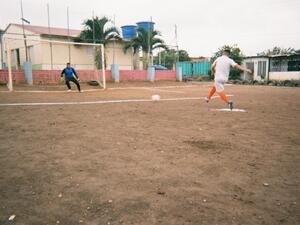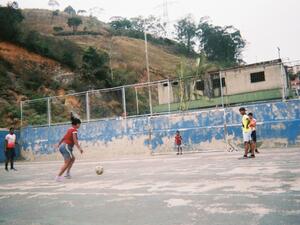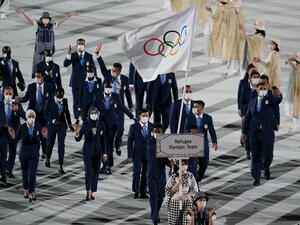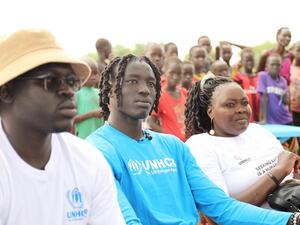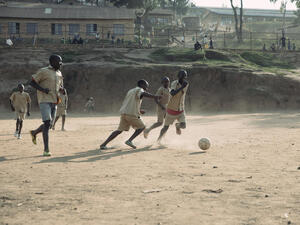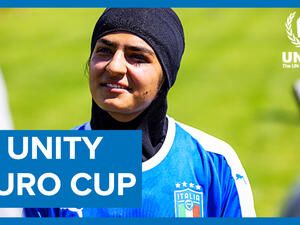Q&A: Former Olympics chief Rogge puts focus on sport for young refugees
Q&A: Former Olympics chief Rogge puts focus on sport for young refugees

Jacques Rogge meets a sport-loving Syrian refugee during his visit last October to the Azraq Refugee Camp in Jordan.
BRUSSELS, Belgium, April 7 (UNHCR) - When Belgian orthopaedic surgeon Jacques Rogge stepped down in 2013 as president of the International Olympic Committee (IOC), he imagined that he would have time to catch up on his reading and other personal interests that he had put aside for years. But when the former Olympic yachtsman was then asked to help spread awareness about the importance of sport for refugee children, he could not resist the challenge. In April last year, he was appointed Special Envoy on Youth Refugees and Sport by UN Secretary-General Ban Ki-moon. This role has brought him into close contact with the UN refugee agency, meeting High Commissioner for Refugees António Guterres last July in Geneva and visiting Jordan's Azraq Refugee Camp, co-managed by UNHCR, in October. To mark yesterday's International Day of Sport for Development and Peace, Rogge spoke in Brussels to UNHCR Communications and Advocacy Officer Frederik Smets about this new venture, telling him: "You can always find time for something you are passionate about." Excerpts from the interview:
How did you end up being appointed to this new post?
I met Secretary-General Ban Ki-moon at the Olympic Winter Games in Sochi in early 2014. This was soon after I had left my position as president of the IOC, and the secretary-general said he knew I had more time now. He asked me if I was willing to accept his proposal to become Special Envoy because he knew that the plight of refugees is something that's always been close to my heart. I thought of it as a very positive challenge. So he did not have to insist much. After a number of exchanges to clarify a few things, I said: "Let's go."
How did you become interested in the plight of refugee youth?
The IOC has always had a strong tradition of corporate social responsibility. It has always been our policy to reinvest more than 90 per cent of the revenues of any Olympic Games into sport at all levels. Most of this investment goes to developing countries, and often to youngsters who do not have a lot of opportunities.
Bringing sport to young people in difficult situations is just a matter of humanity to me. They have no perspectives. They live in very challenging circumstances and have often been subject to violence and unthinkable brutality. I firmly believe that sport can help give them back a sense of identity. It helps them rebuild their lives. It brings back dignity, and it gives them something to focus on.
Last October, you visited Azraq camp. What was your impression?
It was inspiring. That visit more than anything reinforced my feeling that it is everyone's duty to help the young people affected by the war in Syria, and I think sport is one of the best means to do that. Half of the population of Azraq camp is younger than 25 [years]. Despite the obvious language barriers, I could see that playing football, table tennis or other sports was helping the youngsters cope with the harsh living conditions. It keeps them physically and mentally fit. It helps them overcome trauma and restores their self-esteem as well as teaching them about values such as excellence, friendship and respect. Sport also protects them. They learn how to say no to the lure of joining some militia, or to engage in illegal activities. It brings back their sense of dignity, hope and joy.
What projects will you be involved in?
The secretary-general has insisted that more awareness needs to be raised about the need to include sports in the aid provided to young refugees. My main task will be to set up alliances with the Olympic movement and other stakeholders to promote programmes that allow safe, inclusive and sustainable physical activity for refugees through the provision of infrastructure and the organization of activities. There will always be some construction of sport infrastructure, but I basically need to do everything I can to ensure sport is provided for young refugees.
To name just one project, the IOC is now leading the construction of a youth sports centre in Azraq camp, together with CARE Jordan, an NGO that will develop sports programmes for the young refugees in the camp. But we're already planning a second visit, this time to refugee sites in Ethiopia. There, too, we'll first assess the needs and look for financing and support to set up sports infrastructure and programmes. We'll try and do the same in many other places.
What are your priorities for young refugees and sports in the long run?
For pure infrastructure projects, much depends on how long the equipment lasts. All facilities will need maintenance from time to time. But apart from the logistics, the planning depends mostly on how long the refugee camps will be used. As long as youngsters are living in the camps, any very long-term planning will be difficult.
In urban contexts, there are particular challenges because the refugees are not concentrated in one well-defined area. You cannot reach and engage with them so easily. So we will need to draw young refugees to sports activities in a different way. Most Olympic Games were organized in cities. The IOC always worked with national Olympic committees, with local authorities and with certain NGOs. That model can certainly inspire us to work for young refugees in an urban setting.
Budgets for humanitarian operations are getting tighter. Are you worried about funding?
You have to accept that situation [shrinking budgets] to a certain extent, but you also have to understand that sports activities will not affect UNHCR's budget that much. Most of the financing will come from the IOC and other important partners. In that respect, one could say external partners will be setting up all these sports activities in close collaboration with the UN and UNHCR.
Other than that, UNHCR will of course always continue to prioritize what is in the interest of the refugees. The agency is doing a great job at that and has an incomparable expertise when it comes to helping refugees. I'm sure this will continue to be the case.
The private sector will continue to contribute in an important way, both financially and with in-kind donations such as sportswear and infrastructure. One of my tasks is to drum up private sector interest in becoming partners for young refugees and sports. I am working on that now.
Many emergencies are evolving into protracted situations, with millions of youngsters living as refugees for years. Can the sports world help in any way?
The IOC has always worked on peace initiatives through sports. To name one example, the first European Games ever will be held soon in Baku, the capital of Azerbaijan. The team organizing those games has succeeded in getting athletes from both Armenia and Azerbaijan to participate, despite the conflict between those two nations over Nagorno-Karabakh -. That is a very positive message.
I remember sports events conducted with peace-keepers and local communities in the Democratic Republic of the Congo and in Republic of Congo to bring different groups together before elections. That helped calm down the animosity.
Sport builds bridges. It conveys a message of mutual respect and peace. In all the Olympic villages of all the Olympic Games I have attended, athletes of all nationalities, races, languages and religions were living together peacefully. This is also possible off the pitch within host and refugee communities. But this message can only have a lasting impact when it is supported by the political world.
Will you ever get to catch up on your reading?
I think I will. I am used to working hard. You have to know that my job at the IOC was a very busy one. I'm confident that this new role will not be quite so time consuming. That is what makes it a pleasure.
I now mostly live and work in my home town of Ghent and I will occasionally travel for this new role as Special Envoy. I am also sitting on the Commission on Ending Childhood Obesity, which was recently launched by the World Health Organization. In that role, I am dealing with another issue plaguing our youth. So I am doing things that are very dear to me. A day has 24 hours, you know, and I'm a very active person. You can always find time for something you are passionate about.

